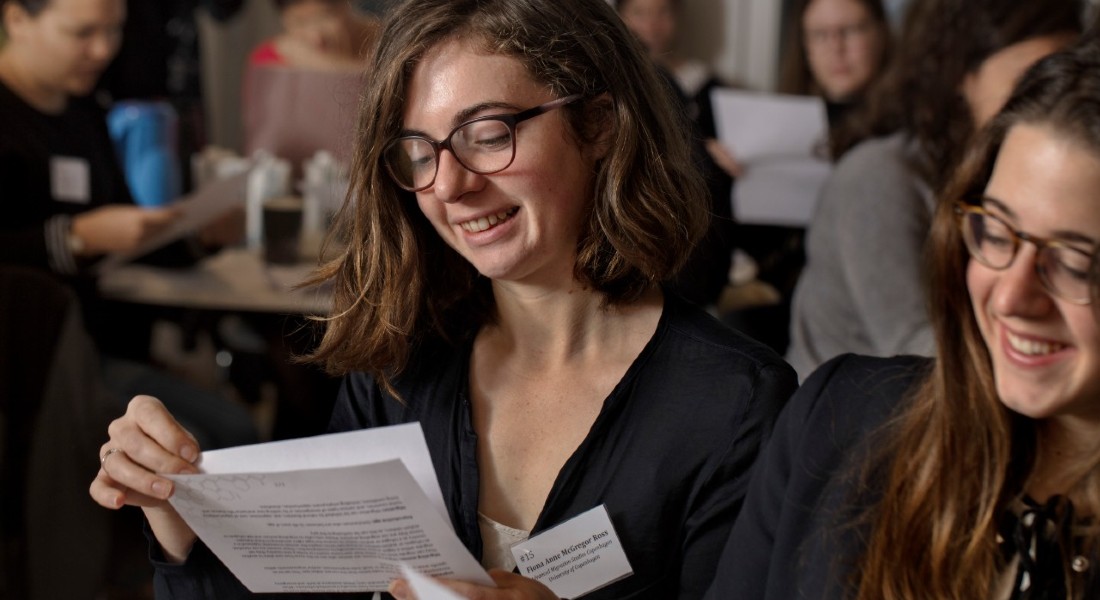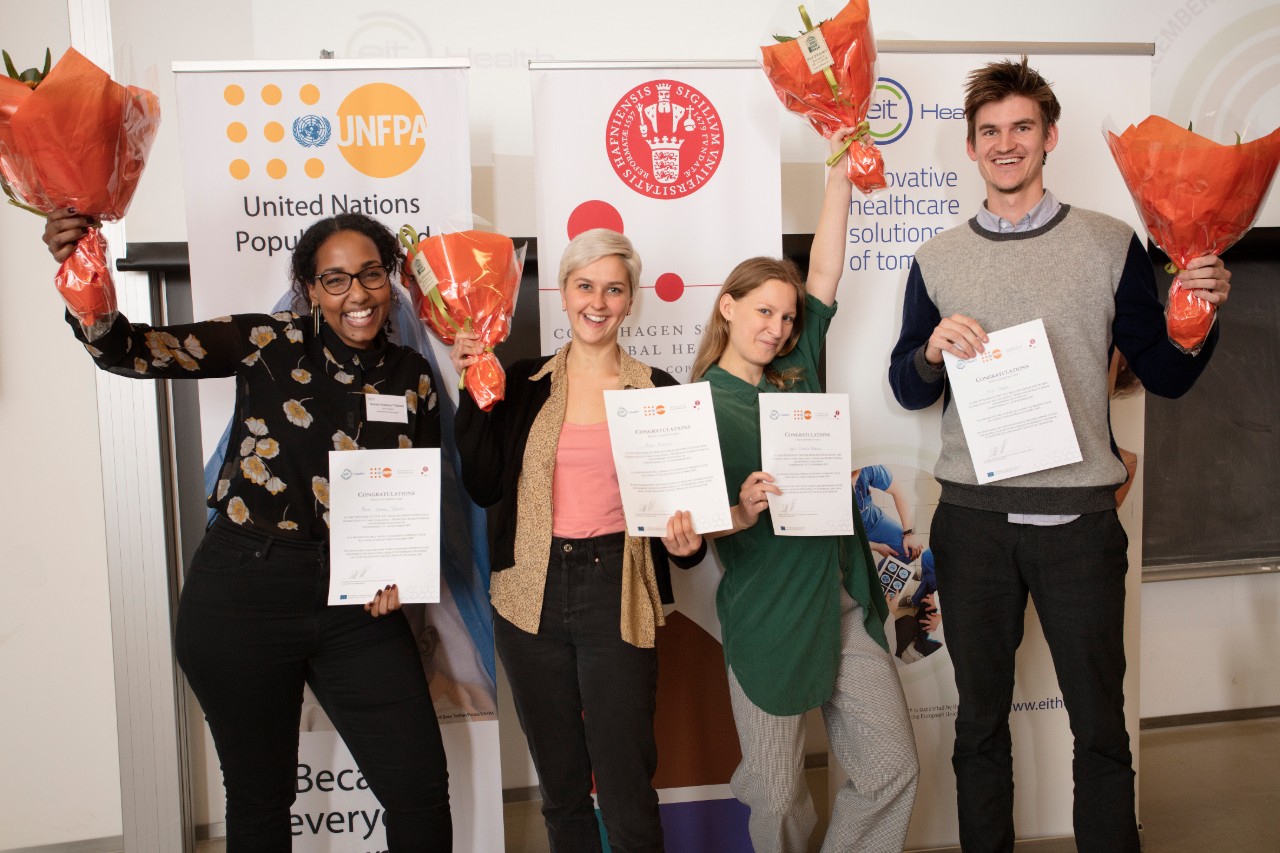Global Health Case Challenge 2017 - The Winning Solution

On 23-24 November 2017 students from all over the world participated in the Global Health Case Challenge on migrating women's sexual and reproductive health. The winning team are from MSc Global Health at University of Copenhagen and they proposed a Blockchain where migrating women can store their health records.
The air in Jens J. Holst Auditorium in the Mærsk Tower was thick with anticipation, when this year’s Global Health Case Challenge was launched on Thursday morning. After speeches by Dean Ulla Wever and Director of the School of Global Health Flemming Konradsen, among others, the students ripped open the envelopes and put their thinking caps on.
135 students had signed up for the challenge, and 18 teams consisting of 89 students from 30 different study programmes at 17 European universities had been selected.
The next 24 hours the teams worked hard to present the strongest innovative, cross-disciplinary solution to UNFPA’s case challenge to the audience and jury.
The 2017 Global Health Case Challenge concerned the sexual and reproductive health of migrating women. The Case Challenge was organised by EIT Health, the United Nations Population Fund (UNFPA) and the University of Copenhagen (School of Global Health, Research Centre for Migration, Ethnicity and Health and the SUND Innovation Hub) as part of the EIT Health Innovation Day.
‘When you ask students from different fields of study and cultural backgrounds to work together, you get exponentially different perspectives on a problem. The ideas will be diverse, facilitating a completely different level of creative suggested solutions. At the same time, the aim of the School of Global Health is to strengthen the students’ job readiness and chances of networking across countries and fields of study, and here the case challenge format represents a unique opportunity’, Professor and Director of School of Global Health Flemming Konradsen.
University of Copenhagen students won for visionary realism
On Friday the decision was made. After several intense pitching rounds and voting among the judges, team no. 10 was called to the stage. A usable and ambitious idea and their ability to sell it on the stage won them the first place.
In their presentation the winning team had prepared a concrete example of a problem facing migrating women: They took their starting point in the story pregnant Maya, who has been displaced by the war in Syria and in that process lost all her health records. Now she is living in Greece and is ill, but unable to get proper help without any kind of record.
The team consists of students; Maria Harasym, Naomi Yemane Tekeste, Nils Skajaa, Sierra Alef-Defoe and Ingrid Elisabeth Andersson – all from MSc Global Health at the University of Copenhagen. Their solution is to use the Blockchain platform for migrating people’s health data – i.e. an unhackable database, where data is stored not on a server, but in the cloud in encrypted form. Migrating women would thus own their data and be able to access them on any computer.

The happy winning team from MSc Global Health at SUND, who on 4 December are travelling to London to present their solution at the EIT Health Summit . Photo: Mikal Schlosser.
’Several members of the jury had practical experience, and it was important for us that the winning solution would be usable in the present-day refugee situation. We chose the Blockchain health data solution, because it is visionary and something the individual refugees can take with them all over the world, but also because it is highly implementable’, says jury member and Vice-Dean for Innovation and External Relations Trine Winterø.
‘Our success was probably to a large extent a result of our ability to work together as a team. We are very happy and excited about getting to further develop the solution’, says member of the winning team Ingrid Elisabeth Andersson about their victory.
Read their blog about their experience and next steps.
On 4 December the winning team will travel to London to present their solution at the EIT Health Summit, and the three best teams have been invited to come and talk to UNFPA representatives about their solution.
The topic of next year’s Global Health Case Challenge in Copenhagen will be Healthy Urban Living, and registration begins in September 2018.
This years case challenge: Migrating Women's Health
In the 2017 case challenge the UNFPA and the University of Copenhagen invited students to spend 24 hours to develop solutions to the global issue of Migrating Women's Sexual and Reproductive Health. The case question was: How can access to sexual and reproductive healthcare services be improved for migrating women in the reproductive age?
All teams pitched their ideas to a jury consisting of representatives from UNFPA Supply Division, University of Copenhagen’s Innovation Unit, Doctors without Borders, and Danish Red Cross. The teams had 5 minutes for pitching and 5 minutes for questions. The jury voted for 1 hour and after a lot of deliberation and debate, they settled on the winners – team 10. Team 10 consists of 5 Master of Science in Global Health students from the University of Copenhagen. They come from different study backgrounds and nationalities, and they combined their interdisciplinary mindsets to create the solution of using Blockchain technology to store migrating women’s medical records. Often migrating women have lost their medical records, cannot describe their medical conditions and there is a lack of translators at the point of care sites throughout their migration. However, Blockchain can be a solution to this as medical staff can easily access the records of the women and provide appropriate care.
Global Migration is increasing due to armed conflicts, mass killings, persecution and pervasive sexual and gender-based violence (SGBV). One of the consequences of this migration is the effect it has on the health and morbidity of the migrating population. They often have disease patterns that differ from those found in the national populations in the countries they moved through or settle in, and they often experience barriers in access to healthcare that are unlike those the national populations experience. These issues create exceptional challenges for health services and health professionals.
From January to November 2015, Europe witnessed 950,469 refugee and migrant arrivals through the Mediterranean, with Greece receiving the vast majority of arrivals (797,372). Those arriving by sea are fleeing the Syrian Arab Republic (49%), Afghanistan (20%), Iraq (8%), Eritrea (4%), Nigeria (2%), Pakistan (2%), Somalia (2%), Sudan (1%), Gambia (1%) and Mali (1%). The majority travel to Turkey, from where they undertake a dangerous journey by sea to Greece and then make their way through the former Yugoslav Republic of Macedonia, Serbia, Croatia, Slovenia and Austria in an attempt to reach their destination countries, mainly Germany and Sweden. New migrants arrive every day and accurate data remains a challenge. Refugees and migrants travel with an urgency to reach their destination from fear of border closures, potentially increased restrictions in asylum policies and the onset of winter.
It is a dangerous journey, with refugees and migrants often facing high levels of violence, extortion and exploitation along the way, as well as lack of access to healthcare. Single women travelling alone or with children, pregnant and lactating women, adolescent girls, unaccompanied children, early-married children — some with newborn babies — persons with disabilities, and elderly men and women are among those who are particularly at risk and require a coordinated and effective protection response.
An UNHCR/UNFPA report found that women and girl refugees and migrants’ sexual and reproductive health is at risk and that the current responses by governments, humanitarian actors, EU institutions and agencies and CSOs are inadequate. The findings emphasize the urgent need to scale up response efforts, implement innovative solutions and strengthen protection mechanisms and services across borders to adequately address the protection and health risks facing women and girls.
